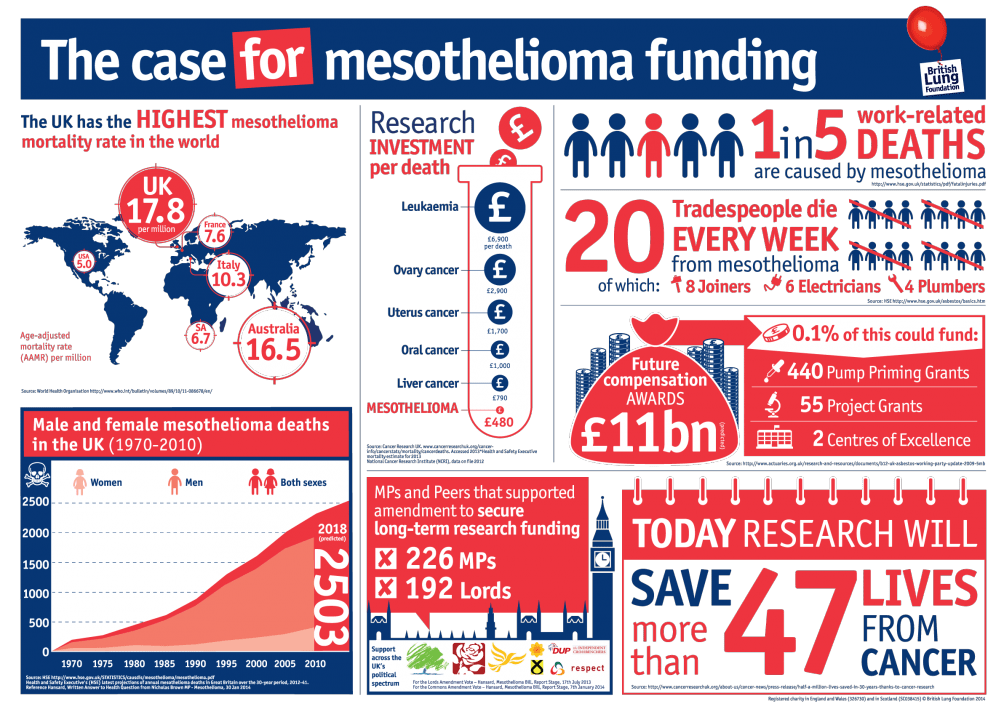
by Dr Penny Woods
Imagine a disease that killed almost 50 people every week. Most of them died simply because they went to work. There would be an outcry, measures would be put in place to help people, research would receive funding to figure out how to treat people, how to cure them.
Sadly, you don’t have to imagine. There is a disease that kills over 2,500 people every year in the UK. It accounts for a shocking 1 in 5 work-related deaths. Tradespeople are most at risk – it is estimated that every week 4 plumbers, 8 joiners, and 6 electricians die from this deadly disease.
It is called mesothelioma – an asbestos-related lung cancer which affects the lining of the lungs. Many people have never heard of it, and diagnosis can therefore come as a shock. Fewer than one in 10 people will survive even three years after their diagnosis, with many dying within months. The disease is cruel in its dormancy, often developing decades after the time of the original exposure to asbestos.
Coming to terms with such a hopeless outlook from something that may have happened decades ago, when you have done nothing to warrant it except go to work, is challenging at best. Couple this with the fact that there are few effective treatments and no cure, and it’s downright devastating.
The nasty nature of the disease makes new figures published by the Health and Safety Executive (HSE) even more worrying for the UK. A study of mesothelioma mortality rates from 1958 to 2013 shows that the UK continues to have the worst mortality rates for the cancer in the world[1]. Unless new treatments are found, it is estimated that 60,000 people will die of mesothelioma in the UK over the next 30 years. Sustainable investment in research is the only thing likely to change such a dreadful prognosis.
There is no reason why mesothelioma research funding should lag so seriously behind other diseases, but it does. In 2012, almost £10 million was spent on research into skin cancer, which kills a similar number of people, compared to £1.2 million invested in mesothelioma research[2].
Organisations like the British Lung Foundation (BLF) and the Mick Knighton Mesothelioma Research Fund (MKMRF) – part of the BLF – have helped to fund new research and research institutions, such as Europe’s first mesothelioma tissue bank, to help researchers develop new ways fighting this terrible cancer.
Yet this alone is not enough. It is estimated that today research will save 47 lives from cancer.[3] It is high-time that people with mesothelioma were included in that number.
Equally as important is ensuring no one is exposed to asbestos in the first place. That’s why the BLF is partnered with the British Occupational Hygiene Society’s Breathe Freely campaign, which, through collaboration with other organisations, aims to prevent occupational lung disease through the implementation of effective exposure control.
It is clear that in the UK the case for mesothelioma research funding can no longer be overlooked. The potential is there to do significantly better. It is time we stop ignoring these deaths and help to protect and save those people that are so adversely affected, simply because of their trade.
For more information on mesothelioma please visit the BLF website www.blf.org.uk/meso.
 Dr Penny Woods is Chief Executive of the British Lung Foundation (BLF), the leading UK research, campaigning and patient support charity for people affected by lung disease. Dr Woods joined the BLF in 2012. She qualified as a medical doctor in 1987 and has an MA from Cambridge University and an MBA from INSEAD. Dr Woods has many years of experience in the healthcare sector, working as a management consultant for a range of clients including governments in the UK and overseas, multi-national companies, NHS organisations and private providers of healthcare. Prior to joining the BLF, she spent three years as Chief Executive of the not-for-profit patient organisation, the Picker Institute Europe. Her passion for working on behalf of patients comes from personal experience with family members with motor neurone disease, cancer, asthma & obstructive sleep apnoea.
Dr Penny Woods is Chief Executive of the British Lung Foundation (BLF), the leading UK research, campaigning and patient support charity for people affected by lung disease. Dr Woods joined the BLF in 2012. She qualified as a medical doctor in 1987 and has an MA from Cambridge University and an MBA from INSEAD. Dr Woods has many years of experience in the healthcare sector, working as a management consultant for a range of clients including governments in the UK and overseas, multi-national companies, NHS organisations and private providers of healthcare. Prior to joining the BLF, she spent three years as Chief Executive of the not-for-profit patient organisation, the Picker Institute Europe. Her passion for working on behalf of patients comes from personal experience with family members with motor neurone disease, cancer, asthma & obstructive sleep apnoea.
[1] WHO, http://www.who.int/bulletin/volumes/89/10/BLT-11-086678-table-T1.html
[2] NCRI Research Funding 2002-2012
[3] http://www.cancerresearchuk.org/about-us/cancer-news/press-release/2013-07-09-half-a-million-lives-saved-in-30-years-thanks-to-cancer-research
What makes us susceptible to burnout?
In this episode of the Safety & Health Podcast, ‘Burnout, stress and being human’, Heather Beach is joined by Stacy Thomson to discuss burnout, perfectionism and how to deal with burnout as an individual, as management and as an organisation.
We provide an insight on how to tackle burnout and why mental health is such a taboo subject, particularly in the workplace.


 Dr Penny Woods is Chief Executive of the British Lung Foundation (BLF), the leading UK research, campaigning and patient support charity for people affected by lung disease. Dr Woods joined the BLF in 2012. She qualified as a medical doctor in 1987 and has an MA from Cambridge University and an MBA from INSEAD. Dr Woods has many years of experience in the healthcare sector, working as a management consultant for a range of clients including governments in the UK and overseas, multi-national companies, NHS organisations and private providers of healthcare. Prior to joining the BLF, she spent three years as Chief Executive of the not-for-profit patient organisation, the Picker Institute Europe. Her passion for working on behalf of patients comes from personal experience with family members with motor neurone disease, cancer, asthma & obstructive sleep apnoea.
Dr Penny Woods is Chief Executive of the British Lung Foundation (BLF), the leading UK research, campaigning and patient support charity for people affected by lung disease. Dr Woods joined the BLF in 2012. She qualified as a medical doctor in 1987 and has an MA from Cambridge University and an MBA from INSEAD. Dr Woods has many years of experience in the healthcare sector, working as a management consultant for a range of clients including governments in the UK and overseas, multi-national companies, NHS organisations and private providers of healthcare. Prior to joining the BLF, she spent three years as Chief Executive of the not-for-profit patient organisation, the Picker Institute Europe. Her passion for working on behalf of patients comes from personal experience with family members with motor neurone disease, cancer, asthma & obstructive sleep apnoea.
[…] The case for mesothelioma research funding – Unless new treatments are found, it is estimated that 60,000 people will die of mesothelioma in the UK over the next 30 years. Sustainable investment in research is the only thing likely to change such a dreadful … […]
Accidental exposure to asbestos is avoidable – take a look:
https://www.linkedin.com/pulse/asbestos-do-you-want-nearly-safe-really-vince-butler?trk=prof-post
[…] The case for mesothelioma research funding – It is clear that in the UK the case for mesothelioma research funding can no longer be overlooked. The potential is there to do significantly better. It is time we stop ignoring these deaths and help to protect and save those people that are so adversely … […]